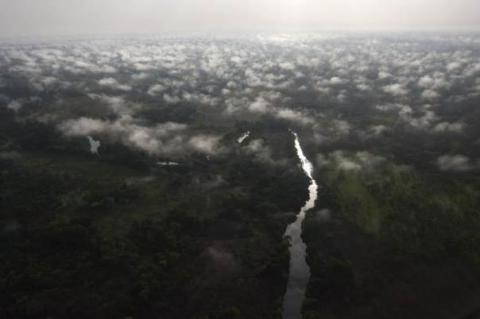Advertisement
Congo signs landmark $200 million deal to protect forests
DAKAR (Reuters) - The Democratic Republic of Congo on Friday signed a landmark $200 million deal with donors to tackle deforestation and reduce carbon emissions as part of a wider plan to protect the tropical forests of the Congo Basin.
Congo, home to the world's second-largest rainforest after the Amazon, is the first country to sign an agreement with the Central African Forest Initiative (CAFI), launched in September 2015 by six African nations and European donor countries.
The initiative, which also covers Central African Republic, Cameroon, Congo Republic, Equatorial Guinea and Gabon, aims to restart protection efforts in the Congo Basin, which has become a target for the expansion of palm oil plantations as available land in Indonesia dwindles.
Protecting forests is widely seen as one of the cheapest and most effective ways to reduce the emissions driving global warming. Loss and degradation of forests account for about 15 percent of emissions each year, conservation groups say.
The project requires countries to create national investment plans to address the pressures driving deforestation, and aims to slow illegal logging and burning of forests that are vital to millions of people and endangered animals such as gorillas.
It is backed by funding from the European Union, Norway, Britain, France and Germany, and will receive technical advice from Brazil.
Norway's Minister of Climate and Environment Vidar Helgesen said the agreement should be thought of "as a compass".
"It sets the ambitious direction that DRC will take in order to avoid the kind of industrial deforestation that we have witnessed in other parts of the world," he said in a statement.
Forests in the Congo Basin cover about two million sq km (0.8 million sq miles) - about the size of Mexico - but are shrinking by 5,600 sq km a year.
Congo's biggest logging companies are systematically violating national laws to plunder the country's forests, campaign group Global Witness said in a report last year.
President Joseph Kabila has pledged to reform agriculture in Congo, which is rich in minerals and fertile land, but has seen decades of misrule and a series of conflicts since the 1990s.
Dozens of armed groups continue to prey on the local population and exploit the region's rich mineral deposits, and a political crisis is brewing over the possibility of Kabila seeking a third term in office, according to U.S. officials.
(Reporting By Kieran Guilbert, Editing by Ros Russel)



















Add new comment